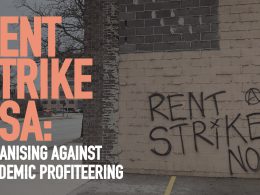The Risen People, playing at the Abbey Theatre until February, follows the lives of a group of working-class Dubliners through the heroism and suffering of the 1913 lockout.
On the one hand the audience sees the misery and hunger the strikers faced into after the bosses resolved to starve them out of Larkin’s union, the ITGWU. The few items in the tenement home on the stage gradually vanish as the months wear on, sold to the pawn shop.
On the other hand, the play inspires the audience with the courage of the strikers. Even the bravest of them show some weaknesses and waverings, but even the weakest and most downtrodden show their inner strength at times.
In the sharp, often funny conversations between characters Plunkett manages to squeeze in a lot of history without sacrificing the drama and with the dialogue always natural and entertaining.
Anyone who’s read Plunkett’s classic novel Strumpet City will find that The Risen People rings a lot of bells. The play (first performed in 1958) introduced many of the characters and events that were later developed and fleshed out in the novel, adding another level of enjoyment for Strumpet City fans.
The role of women in the Lockout
The portrayal of women in the play is very unfair and reflects the time when it was written. Women feature largely as workers’ wives nagging their militant husbands to go back to work, completely unable to see the bigger picture or the importance of the struggle. This view of the role of women leads to one extremely ugly incident.
In reality, women were a key part of the 1913 lockout. Thousands of young women went on strike in Jacob’s Mills, thousands of women were there when the ITGWU was founded, and huge numbers of women “and even young girls of 15 or 16” fought police and scabs hand-to-hand.
This problem is the fault of the author and the time he lived in, not the superb cast or crew of this excellent production.
The cast and two musicians perform a broad range of music, from ballads of the lockout to folk tunes and socialist songs, some uplifting, some tragic, funny or militant. The American folk song “O Death” is performed as Mrs Hennessy thinks about her sons and daughters who never made it past infancy, and about the hunger and cold that are closing in as the strike goes on. An original song, “Jib Jib,” makes us laugh out loud at one moment and feel deep sympathy the next.
The classic socialist anthem “The Internationale” features a lot. Although Billy Bragg’s version of the lyrics, written in 1990, seem a bit out of place, the inspiring tune adds a lot to the play.
The Labour Party, now in the pockets of business and the bankers, has tried to claim ownership of the 1913 struggle a century later. But The Risen People reminds us that the lockout had nothing to do with the politics of hacks and establishment politicians. The most militant strikers in the play are correctly portrayed as socialists, and projections between scenes include quotes from Karl Marx and the Russian revolutionary Lenin who watched events in Dublin in 1913 with awe. Other quotes remind us that the leader of the struggle Jim Larkin was himself a revolutionary and a socialist.
After years of working people being battered by the establishment just to bail out the rich and their failed system, the class politics of The Risen People remind us of the lessons of history. In the play, even strikers such as Fitz who do not seem to be conscious socialists understand very deeply that the only way working-class people can hope for a better future is through solidarity and struggle, even if struggle means risk and sacrifice.
Make sure to get your copy of the Socialist Party’s book on the 1913 Lockout, Let Us Rise, on sale for €5
[author] Manus Lenihan is a Socialist Party activist in Dublin.[/author]












